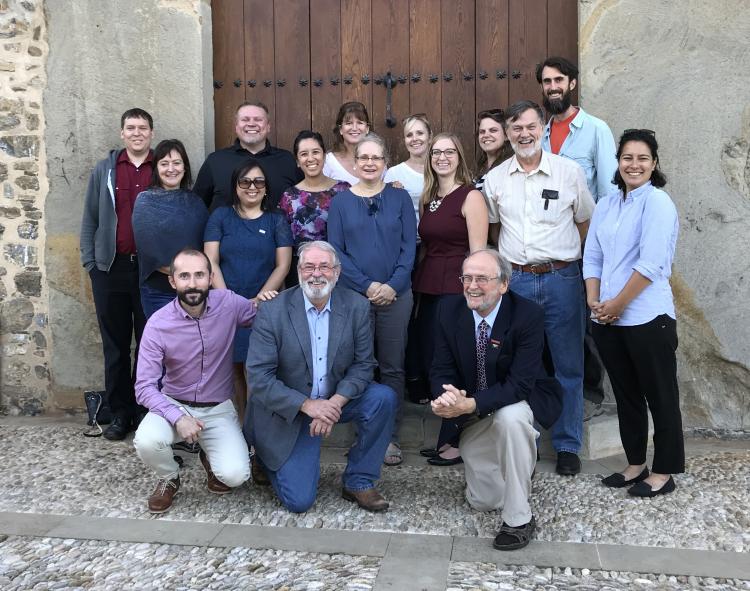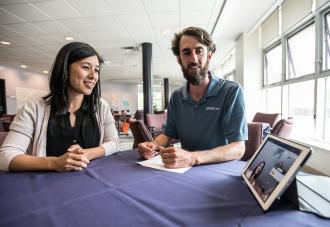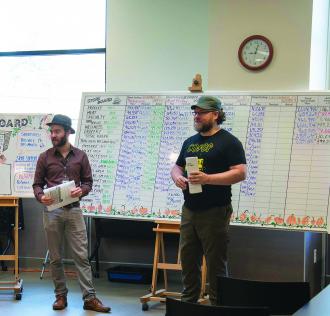Cooperative Management Education at Saint Mary's University



In an increasingly competitive grocery market, it is common to recruit and train with a focus on business acumen. A prudent board will hire management who have the skills to run the business. The question remains, how is managing a cooperative business different?
In essence, cooperative business marries the enterprise aspect and the association aspect of the entity. It is joint ownership and democracy, grounded in values and principles that are market differentiators for this business model. The same market pressures exist, but the truly unique opportunity for cooperative business is to provide a different user-owner experience. Engagement resting on members’ psychological ownership of the business is at the heart of this unique model. These components are what comprise the cooperative difference.
These notions sound good in theory, but how can we operationalize them? How can managers optimize the cooperative business model for the benefit of all stakeholders, with an eye to sustainability and competition? It takes the right education. It takes a deep dive into cooperative business concepts, and integrating them into strategy.
Cooperative leaders around the globe debated and discussed the risk of applying the logic of other business models to cooperatives. Increasingly, cooperative boards were recruiting people from non-cooperative businesses, and traditional MBA programs were being encouraged and supported as the education of choice for cooperative managers. It was identified that this trajectory would spell the dilution of the cooperative difference and possibly lead to demutualization.
Finding a home at Saint Mary’s University
Cooperators determined that cooperatives needed formalized, in-depth, business education that not only helped cooperative leaders do good work, but that helped cooperatives thrive and innovate. They envisioned an international program that involved students and instructors from around the world. The concept was developed further by leaders and educators in Atlantic Canada and shopped around to business schools in the region.
Saint Mary’s University in Halifax, Nova Scotia, was fully behind the idea. They already had a well-established, fully accredited business school that was interested in teaching more courses in ethical business. Tom Webb, a thought leader and author of From Corporate Globalization to Global Co-operation: We Owe It To Our Grandchildren (reviewed by Dave Gutknecht in the previous issue of Cooperative Grocer), stewarded the founding of a master’s program in cooperative business.
By 2003, the first cohort of students in Master of Management, Co-operatives and Credit Unions was meeting in Halifax for orientation. The program is designed to be online and part-time so students can continue working and also use their cooperative as a living lab to integrate new business concepts. Students gather to connect with peers, instructors, and international leaders for a 5-day orientation before online courses begin. The second in-person component is a 10-day study tour to either Italy or Spain to experience, first-hand, regions of the world that have a high density of cooperative institutions.
Everything else is offered online, so students can work and study, from anywhere in the world, in tandem. Students study all of the main disciplines you would find in a traditional MBA program (marketing, accounting and finance, people management, etc.), while being fully grounded in the cooperative business model, from the cases analyzed to the peer discussions. In addition, courses on cooperative history and cooperative economics, among others, are included as cornerstones of this education.
In the last 15 years, numerous food cooperative managers and staff have been through this education. They report they are stronger managers, with an increased ability to manage the cooperative difference, innovate, make decisions, increase meaningful member engagement, manage the financials, and deal with market pressures.
How does the education apply?
Dan Arnett, cooperator in chief at Sacramento Natural Foods Co-op, completed the Master of Management, Co-operatives and Credit Unions program in 2015. He has served nearly every role in food co-ops over the years, from sweeping the floor to CEO.
Arnett is a proud alumnus, explaining, “Sometimes, in this work, you can get ‘store blind’ and lose perspective. Saint Mary’s helped me see far beyond the minutia of my work and gave me a more anchored approach to strong cooperative management. I got a lot out of the case studies as well as learning from people like Tom Webb and other leading cooperative thinkers. In terms of direct implementation, I changed the treatment of capital in my former cooperative (Central Co-op), and I couldn’t have contributed to how we reformed our governance structure there without the lessons I learned from the study tours (Mondragon, Spain; and Emilia Romagna, Italy). I have now restructured our reporting approach in my current co-op as well. I gained a deep understanding, through the Saint Mary’s education, that we cannot frame ourselves as a transactional business. There is a transformational potency existing in the cooperative business model.”
Earlier this year, Jeff Bessmer (a 2014 graduate of the Master’s program) was hired at the co-op Arnett leads in Sacramento.
Bessner and Arnett had worked together to bring Tacoma Food Co-op and Central Co-op together into a stronger, solidarity cooperative that could better serve their members and communities. In the course of that transition, they were able to integrate employees into the governance system of the cooperative as well—envisioning a stronger organization with a better representation of stakeholder voices in the democratic processes.
Arnett shares, “I really notice the difference in sophistication of conversations and strategies Jeff and I can create together,” both having had a cooperative education at Saint Mary’s. “Jeff takes a refreshing perspective on recruiting new talent and onboarding new employees. It makes a huge difference for our co-op.”
Bessmer, who serves as the recruiting and onboarding manager, stated, “The Cooperative Management Education suite of programs offered by Saint Mary’s equips students to bring a literal world of cooperative innovations and problem solving to the co-ops they lead. We made this happen in our merger in Seattle—in a small, struggling co-op, the lesson of co-ops around the world merging for mutual success broadened our toolkit to solve our co-op’s problems, and we did so in an exciting way that engaged the membership and broader cooperative community. It also shows that embracing our cooperative identity is how we will thrive in competitive times, as we have been able to do in Sacramento through our innovative immersion week and hiring process.” Perhaps more heads are better than one—especially if they have lots of cooperative business lessons and tools primed for use.
Sean Doyle, a 2008 graduate and general manager at Seward Community Co-op in Minneapolis, Minn., believes firmly that people need special skills to be able to run an effective cooperative business. His co-op aims to enroll at least one employee in the master’s program each year in order to keep their co-op strong—both as enterprise and as an association. Doyle is particularly encouraged by the amount of exchange and broadening of horizons between food co-op leaders and people in other co-op businesses. He has been a guest speaker for the shorter in-person courses on cooperative business strategy and enhancing performance.
Doyle states, “The course on ‘Enhancing Business Performance through Co-operative Management Practices: How to strengthen identity, loyalty and participation’ is a great opportunity to meet cooperators and share experiences from all sectors—credit unions, mutuals, consumer and worker co-ops—in a deep exploration about the cooperative advantage we all have in our respective businesses. I have been to two and both times have come away regenerated with new ideas on how to more effectively manage Seward Co-op.”
Matthew Epperson, the human resources manager and bookkeeper (2015 Master’s graduate) at Daily Groceries Co-op in Athens, Ga., was strongly encouraged to start thinking of his work in the co-op as a career and not just a job. “As I progressed through the education, I got more inspired. Saint Mary’s helped me thoroughly grasp the cooperative difference and how our values and principles give us our cooperative distinction and make us stand out in a crowded marketplace. I gained a lot in terms of understanding the wider co-op ecosystem and being able to put people at the center of the economy. I have transformed how I do orientation with new employees and the education on MOCA—marketing our cooperative advantage—has completely changed my approach to social media and communications.”
In addition, Epperson has taken on heading up the Georgia Cooperative Development Center and special initiatives within his co-op such as the anti-oppression work of ‘Team Equity’. From inspiration to action, having a strong foundation of cooperative business principles, cases, and concepts serves as a huge advantage.
What is available today?
Over the years, in response to requests from cooperative leaders, the master’s program has evolved into a suite of programs to support strong cooperative leadership. With options ranging from three days to three years, there is something for everyone along their learning journey. There is a graduate diploma (20 months, online, part-time); a certificate in co-operative management (10 months, online, part-time); and three-day courses in strategy and cooperative finance (held in different destinations around the world). Visit www.managementstudies.coop to review your options. •







